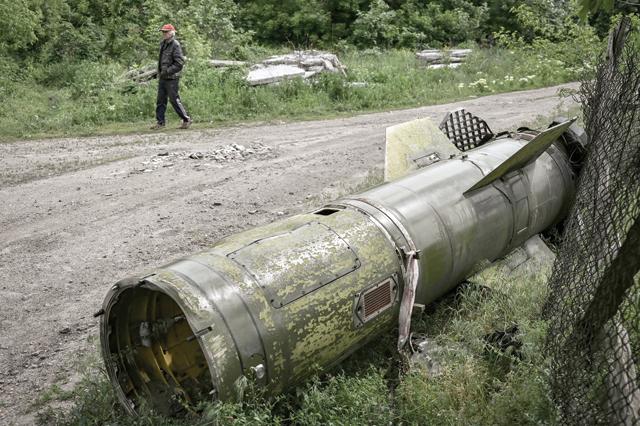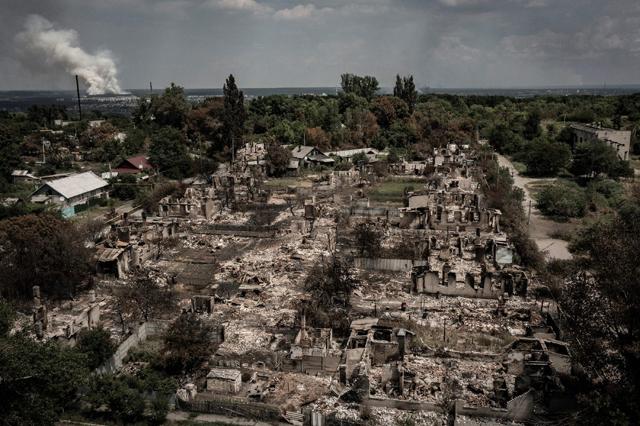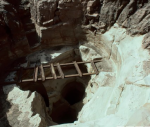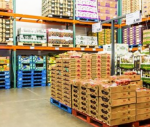You are here
Germany vows Putin 'won't win' Ukraine war as Russians advance
By AFP - May 26,2022 - Last updated at May 26,2022
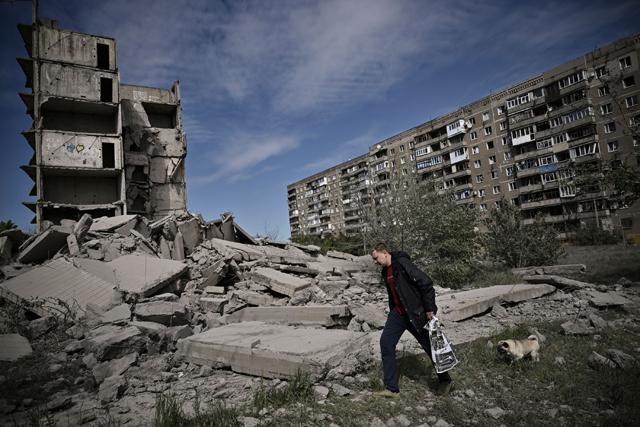
A man walks past a damaged building after a strike in Kramatorsk in the eastern Ukranian region of Donbas, on Wednesday (AFP photo)
KYIV, Ukraine — German Chancellor Olaf Scholz vowed Thursday that Vladimir Putin will neither win the Ukraine war nor dictate the terms for peace, as Russian troops made fresh attempts to take a key eastern city.
Ukrainian officials said Russian forces had tried to storm the besieged industrial hub of Severodonetsk and nearby Lysychansk, the focal point of Moscow's renewed offensive in the Donbas region.
Ukrainian President Volodymyr Zelensky called on the West to offer help "without limits", specifically heavy weaponry for his outgunned troops, and blasted suggestions a negotiated peace could include territorial concessions.
European powerhouse Germany has faced frequent Ukrainian criticism for not doing enough to help, but Scholz underscored the "resolve and strength" of Berlin and
Western allies.
"Our goal is crystal clear, Putin must not win this war. And I am convinced that he will not win it," the German chancellor told the World Economic Forum in Davos.
Putin has "already failed in all his strategic aims" and Russia's plan to capture all of Ukraine is "further away today than it was at the beginning" of its invasion on February 24.
“It is a matter of making it clear to Putin that there will be no dictated peace,” said Scholz. “Ukraine will not accept that and neither will we.”
‘I am not scared’
Since failing in its early objective of capturing Ukraine’s capital, Moscow’s army has plotted a slow but steady course deeper into the country’s eastern Donbas region.
Fierce fighting is now centred on Severodonetsk, as Ukrainian forces try to stop Russian troops encircling the city and cutting off the lone road in.
Ukraine’s presidency said in a morning update that “Russian troops tried to storm Severodonetsk and Lysychansk”, with three people killed in Lysychansk.
“It is clear that slowly, slowly, our guys [Ukrainian soldiers] are simply retreating to more fortified positions,” Lugansk regional governor Sergiy Gaiday said on Telegram on Thursday.
“It’s very hard for the guys. Extremely hard. But they are holding on”.
In the eastern front city of Kramatorsk, children are roaming the rubble as the sound of shellfire booms.
“That was a 22 [122-mm artillery],” said Yevgen, a sombre-looking 13-year-old who moved to Kramatorsk with his mother from the ruins of his village Galyna.
“I am not scared,” he declared as he sat alone on a slab of a destroyed apartment block. “I got used to the shelling in Galyna.”
Four civilians were killed in shelling in the Donetsk region around Kramatorsk, while two were killed in Kharkiv region in the northeast, the Ukrainian presidency said.
‘Without limits’
As the fighting raged, Zelensky called out the international community for paying too much attention to Moscow’s interests.
He took specific aim at former US Secretary of State Henry Kissinger and The New York Times for suggesting territorial sacrifices might be necessary to end the conflict.
Kissinger, the 99-year-old champion of realpolitik, this week told Davos that a return to the “status quo” before Russia’s invasion would prevent a broader war.
Russia formally annexed Crimea in 2014, while separatist groups aligned with Moscow have controlled parts of Donbas, which comprises Donetsk and Lugansk regions, since the same time.
But Zelensky ruled out any such concessions and urged the West to add to the billions of dollars of weapons it has already poured into Ukraine.
“We need the help of our partners — above all, weapons for Ukraine. Full help, without exceptions, without limits, enough to win,” Zelensky said in his daily address to the nation.
Ukrainian Foreign Minister Dmytro Kuleba had earlier told Davos that his country “badly” needs multiple-launch rocket systems to match Russian firepower.
Kyiv has also been pushing for a full energy embargo on Russia in addition to the sweeping economic sanctions already imposed on Moscow since the invasion.
‘Show me one Nazi!’
Russia’s central bank cut its key interest rate Thursday to 11 per cent from 14 per cent following an emergency meeting, as authorities sought to rein in the ruble which has surged in value despite the conflict in Ukraine.
Moscow slapped strict capital controls to boost the economy after the imposition of the sanctions and since then the ruble has staged a spectacular rebound, but Russia fears a strong ruble can hit budget revenues and exporters.
Russia has meanwhile called on the West to lift the sanctions in exchange for freeing up grain exports, with fears mounting of a global food crisis, particularly in Africa.
The Kremlin is also seeking to tighten its grip over the parts of Ukraine it occupies, including fast-tracking citizenship for residents of two southern regions that are mostly under Russian control.
The United States branded the plan an “attempt to subjugate the people of Ukraine”.
Even in areas where Ukraine has pushed back Russian forces, such as around the second city of Kharkiv, the shells continue to fall.
Russia’s rationale of a “special military operation” to “demilitarise and de-Nazify” Ukraine draws a snort of derision in one village near Kharkiv.
“Show me one Nazi in the village! We have our nation, we are nationalists but not Nazis nor fascists,” says retired nurse Larysa Kosynets.
Related Articles
KRAMATORSK, Ukraine — The battle for control of the eastern Ukrainian region of Donbas raged on Sunday as Russian forces tightened their gri
KRAMATORSK, Ukraine — Ukraine said on Monday its forces had been pushed back from the centre of key industrial city Severodonetsk, where Pre
LYSYCHANSK, Ukraine — Russia said on Tuesday it would establish a humanitarian corridor to evacuate civilians from a chemical plant in Sever


